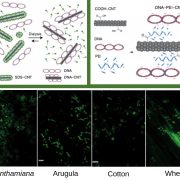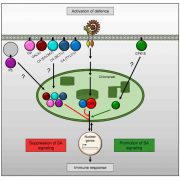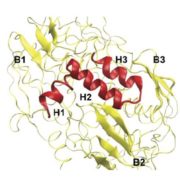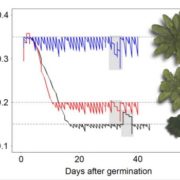A kinase fusion protein from Aegilops longissima confers resistance to wheat powdery mildew
 The obligate biotrophic pathogen Blumeria graminis f. sp. tritici (Bgt) is the cause of wheat powdery mildew, a foliar disease that results in significant yield loss in most wheat-growing regions across the globe. This research focuses on the identification and functional analysis of the powdery mildew resistance gene Pm13, which was introgressed into wheat from Aegilops longissima. The gene was identified through a comprehensive approach that revealed its critical role in conferring resistance to wheat powdery mildew. Pm13 encodes a unique fusion protein that combines elements typically associated with the regulation and signaling of cell death. The validation of Pm13 function, confirmed through various genetic assays, underscores its importance in enhancing disease resistance. Notably, a specific segment of the protein was shown to initiate cell death, highlighting the gene’s potential impact on improving wheat resilience through targeted breeding or genetic engineering. This discovery adds a valuable tool to the arsenal for combating powdery mildew in wheat. The findings also highlight the potential of wild relatives, such as Aegilops longissima, to enhance disease resistance in cultivated wheat. (Summary by Muhammad Aamir Khan @MAKNature1998) Nature 10.1038/s41467-024-50909-6
The obligate biotrophic pathogen Blumeria graminis f. sp. tritici (Bgt) is the cause of wheat powdery mildew, a foliar disease that results in significant yield loss in most wheat-growing regions across the globe. This research focuses on the identification and functional analysis of the powdery mildew resistance gene Pm13, which was introgressed into wheat from Aegilops longissima. The gene was identified through a comprehensive approach that revealed its critical role in conferring resistance to wheat powdery mildew. Pm13 encodes a unique fusion protein that combines elements typically associated with the regulation and signaling of cell death. The validation of Pm13 function, confirmed through various genetic assays, underscores its importance in enhancing disease resistance. Notably, a specific segment of the protein was shown to initiate cell death, highlighting the gene’s potential impact on improving wheat resilience through targeted breeding or genetic engineering. This discovery adds a valuable tool to the arsenal for combating powdery mildew in wheat. The findings also highlight the potential of wild relatives, such as Aegilops longissima, to enhance disease resistance in cultivated wheat. (Summary by Muhammad Aamir Khan @MAKNature1998) Nature 10.1038/s41467-024-50909-6










